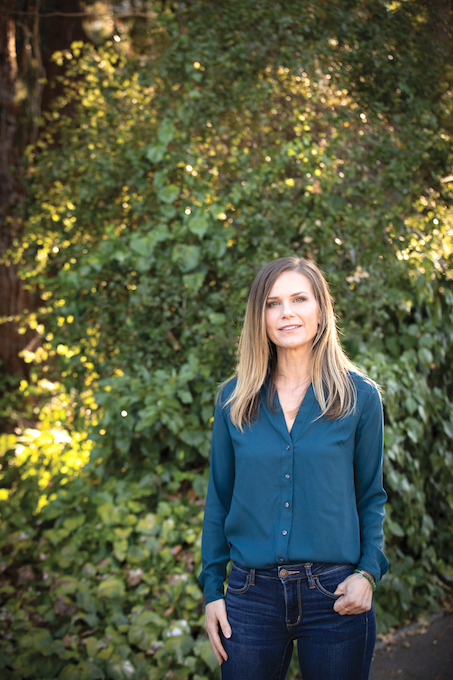
This post was originally published on this site
On the long road of recovery from a traumatic brain injury, Suzy Patz became a completely different person and discovered a new purpose in life.
By Sharon Stello
When Suzy Patz stepped outside to go running before work one summer morning, she had no idea that her life was about to change. The year was 2017 and she was happily married and working in the fast-paced investment industry, managing 150 professional traders worldwide in an office adjacent to the company president. But all of that would start falling like dominoes after what happened next.
While out jogging in Anaheim, Patz was hit by a car and suffered brain damage. In the weeks and months that followed, she had trouble sleeping and eating, could only stay awake for a few hours a day and became hypersensitive to all stimuli, which made watching TV or even having a conversation with others very difficult. There was a moment when she didn’t think she could go on. She thought about ending it all, but didn’t go through with it.
“It’s those dark places that help you see things differently. In order to change a perspective, you often have to go through something incredibly challenging,” says Patz, who is now 46 and living in Laguna Beach.
“… It changed who I was as a person. It was a really, really long recovery. In fact, only about five months ago, did I ‘wake up’ where I have energy [and] I sleep through the night. … Now that I can do things, it’s like life opened up in a completely new way. I get up in the morning, I go swim at the beach. [I’m] just super intentional about how I use my energy.”
She was determined to get better, forcing herself to go for a walk, putting one foot slowly in front of the other and facing the fear of being out on the street where she had been hit by a car not long ago. Patz had previously survived cancer and learned from that experience to do what she felt was helping her improve rather than listening to others’ advice. She went back to work very soon after the accident and her boss was extremely supportive, allowing her to work as many hours as she could manage and keep a cot in the supply closet for naps.
But she soon realized it wasn’t going to work out, staring at a computer all day, communicating by email when she was still having trouble reading. So she switched gears and became a front-of-the-room speaker in the trading and investing education space. She thrived at this new job, becoming one of the top five in the global network. But deep down, she knew this wasn’t her calling. “I realized, … probably a few months before everything shut down [due to the pandemic], that this wasn’t going to be my world anymore,” Patz says.
“It’s those dark places that help you see things differently. In order to change a perspective, you often have to go through something incredibly challenging.” —Suzy Patz
Over the past few years, she had been seeing news reports of frequent school shootings and that suicides and depression, especially among younger people, were on the rise. Patz believed in her heart that these were not one-off situations. “This is something that is an underlying current that is there,” she says. “And so that’s how I discovered what it is I wanted to do—my purpose.”
Patz decided to create an app for children that would help change their mindset from negative to positive. And the pandemic shutdowns, with the unemployment checks that came with it, allowed her the freedom to quit her other job and focus on this new project, which she calls Love Out Loud. Patz wanted to share the lessons she learned during such a difficult time, when she moved from being a fear-based person to embracing her potential.
“I now know nothing is impossible, and how we feel about ourselves and see the world will impact everything we do, feel [and] see,” she says. “We’re currently giving our young people the opposite message, teaching them they are not of value without approval from someone else [and] encouraging them to believe that what they look like matters, to change who they are to fit what’s popular or what gets ‘likes’ [on social media].”
With her new focus, Patz and her team created an app, but after learning about Web 3.0—which is more user-driven than the existing internet—she is planning to have a new, augmented reality mobile game designed to incentivize positive action by tying the value of currency to the recognition of the good that people do. One of her advisers, Ryan Cooper, a classmate from high school in Davis, California, is on the leadership team for the Minecraft video game franchise at Mojang Studios, and Patz will be consulting with psychologists as well. She’s currently seeking funding from investors and then the game will be designed. Details must still be worked out, she says, but, “It would be like if Pokemon Go and Buddha got married and had a baby—on steroids.”
Patz wants this generation of young people, who are so brilliant, giving and sensitive, to realize their worth and potential. The game will teach about the growth mindset and resilience, but “in a way that this generation wants to engage in. It’s not a book, it’s not a class or a seminar or a documentary, it’s ongoing consistent engagement,” she says.
Patz hopes it will draw kids in like an animated movie with a built-in lesson. “You go in because you want to see this fun movie,” she says. “But … you walk away from it with this deeper underlying message of purpose.”






